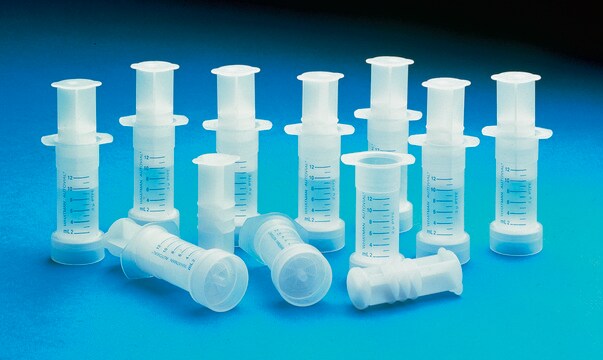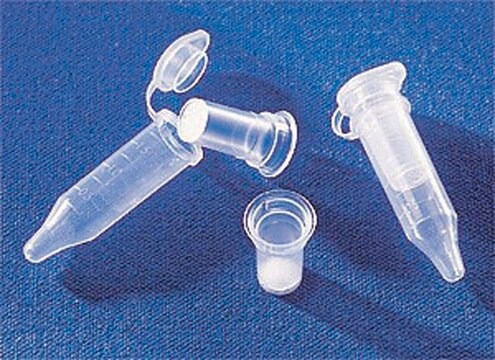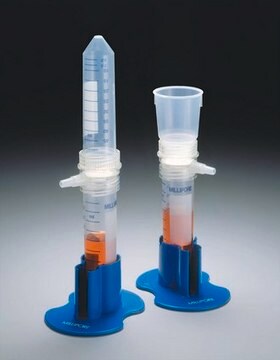WHAAV125EORG
Whatman® Autovials™ syringeless filters
autovial 12 syringeless filter, glass prefilter, PTFE, 0.2 μm, 50/pk
Sinonimo/i:
Z270792, filtration units
About This Item
Prodotti consigliati
Materiali
PTFE membrane
polypropylene housing
Sterilità
non-sterile
Caratteristiche
autoclavable (121°C for 20 minutes)
cap: no
disposable
graduations
Confezionamento
pack of 50
Produttore/marchio commerciale
Whatman AV125EORG
Whatman Article No. 28421433 (US reference)
Capacità
12 mL
Area filtro
3.0 cm2
Misura
Dimensione pori
0.2 μm
Raccordi
male outlet (Slip-tip)
Cerchi prodotti simili? Visita Guida al confronto tra prodotti
Categorie correlate
Descrizione generale
Autovial syringeless filters are preassembled filtration devices for removing particulates from samples. They replace syringe-coupled filtration devices with single, disposable units.
Autovial devices are comprised of two parts: a graduated filter barrel and a plunger. The proven design features an integral filter, built-in air purge and a support stand that protects the recessed slip-luer tip. They are available in a 5 mL and 12 mL volume capacity.
The Autovial filter is selected according to membrane compatibility with the sample. In practice, the sample is poured into the 5 mL or 12 mL capacity filter barrel. The plunger is inserted into the barrel until the bottom is securely in place; there is a gap of air between the sample and plunger. Then, the tip of the Autovial is placed into the mouth of an autosampler vial or container and the plunger compressed. Filtration begins immediately and, as the plunger is compressed until it reaches the bottom, the membrane is purged with air for maximum sample recovery. For direct instrument injection, a needle is placed on the Autovial slip-luer outlet.
Applicazioni
- Cellulose Acetate (CA): low nonspecific protein binding and high loading capacity membrane for biological solutions
- Glass microfiber (GMF): depth filter for samples in aqueous or organic solutions
- Nylon (NYL): for aqueous and organic samples within a pH range between of 3 to 10
- Polyethersulfone (PES): low non-specific protein binding membrane for samples in aqueous solutions
- Polypropylene (PP): Hydrophobic membrane. Resistant to a wide range of organic solvents
- Polytetrafluorethylene (PTFE): PTFE membrane for samples with > 50% organic solvent
- Polyvinylidene Fluoride (PVDF): low nonspecific protein binding membrane for samples in aqueous solutions and/or organic solvents
Caratteristiche e vantaggi
- Single unit convenience saves time. No assembly required - easier to load
- Choice of filter media. Compatible with a wide range of sample types
- Ideal for hazardous samples. Self contained device eliminates risk of filter pop-off
- Built-in air purge maximizes sample recovery
- Sterile option available to maintain sample integrity
- Unique prefilter design for difficult-to-filter samples (no prefilter in Autovial 5 and in selected Autovial 12)
- Choice of glass fiber or polypropylene prefilters
Altre note
Note legali
Scegli una delle versioni più recenti:
Certificati d'analisi (COA)
Ci dispiace, ma al momento non ci sono COA disponibili online per questo prodotto.
Se ti serve aiuto, non esitare a contattarci Servizio Clienti
Possiedi già questo prodotto?
I documenti relativi ai prodotti acquistati recentemente sono disponibili nell’Archivio dei documenti.
Il team dei nostri ricercatori vanta grande esperienza in tutte le aree della ricerca quali Life Science, scienza dei materiali, sintesi chimica, cromatografia, discipline analitiche, ecc..
Contatta l'Assistenza Tecnica.


